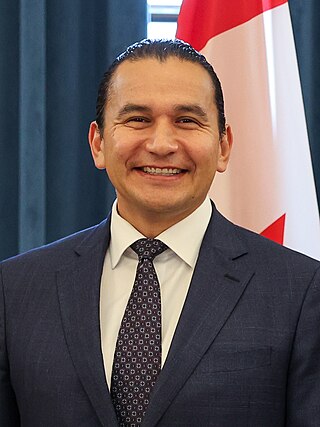This article needs to be updated.(May 2019) |
The Manitoba order of precedence is a nominal and symbolic hierarchy of important positions within the province of Manitoba. It has no legal standing but is used to dictate ceremonial protocol at events of a provincial nature.
- The King of Canada (His Majesty Charles III)
- Lieutenant Governor of Manitoba (Anita Neville, PC OM ) [1]
- President of the Executive Council, otherwise known as the Premier of Manitoba (Wab Kinew, MLA ) [2] [3]
- Chief Justice of Manitoba (Marianne Rivoalen) [4]
- Former Lieutenant Governors of Manitoba in order of seniority of taking office [5]
- Pearl McGonigal, CM OM (1981–1986)
- Yvon Dumont, OM (1993–1999)
- Philip S. Lee, CM OM (2009–2015)
- Janice Filmon, CM OM (2015–2022)
- Former Presidents of the Executive Council of Manitoba in order of seniority in taking office [6]
- Edward Schreyer, PC CC CMM OM CD (1969–1977)
- Gary Filmon, PC OC OM (1988–1999)
- Gary Doer, OM (1999–2009)
- Greg Selinger, OM (2009–2016)
- Brian Pallister, (2016–2021)
- Kelvin Goertzen, (2021)
- Heather Stefanson, (2021–2023)
- Members of the King's Privy Council for Canada residing in Manitoba by order of seniority of taking the Oath of Office
- Otto Lang, PC OC KC (1968)
- Jake Epp, PC OC (1979)
- Lloyd Axworthy, PC OC OM (1980)
- Jack Murta, PC (1984)
- Charles Mayer, PC (1984)
- Jon Gerrard, PC MLA (1993)
- Rey Pagtakhan, PC (2001)
- Raymond Simard, PC (2004)
- Vic Toews, PC KC (2006)
- Steven Fletcher, PC MP (2008)
- Shelly Glover, PC MP (2013)
- Candice Bergen, PC MP (2013)
- MaryAnn Mihychuk, PC MP (2015)
- Dan Vandal, PC MP (2019)
- Terry Duguid, PC MP (2025)
- Members of the Executive Council of Manitoba in relative order of seniority of appointment [2]
- Uzoma Asagwara, MLA (2023)
- Ron Kostyshyn, MLA (2023)
- Matt Wiebe, MLA (2023)
- Nahanni Fontaine, MLA (2023)
- Bernadette Smith, MLA (2023)
- Nello Altomare, MLA (2023)
- Ian Bushie, MLA (2023)
- Malaya Marcelino, MLA (2023)
- Jamie Moses, MLA (2023)
- Lisa Naylor, MLA (2023)
- Adrien Sala, MLA (2023)
- Renée Cable, MLA (2023)
- Tracy Schmidt, MLA (2023)
- Glen Simard, MLA (2023)
- Mintu Sandhu, MLA (2024)
- Nellie Kennedy, MLA (2024)
- Mike Moroz, MLA (2024)
- Mike Moyes, MLA (2025)
- Chief Justice of the Court of King's Bench of Manitoba (Glenn Joyal) [7]
- Speaker of the Legislative Assembly of Manitoba (Tom Lindsey, MLA ) [8]
- Puisne Judges of the Court of Appeal and of the Court of King's Bench in relative order of seniority of appointment [7] [9]
- Robert Carr (1983; supernumerary since 2006)
- Michel Monnin (1984)
- Kenneth R. Hanssen (1984; supernumerary since 2008)
- Kris Stefanson (1988; supernumerary since 2008)
- Rodney Mykle (1989; supernumerary since 2007)
- Gerry Mercier, KC (1989; supernumerary since 2009)
- Robyn Diamond (1989; supernumerary since 2011)
- Jeffrey Oliphant (1990; supernumerary since 2008)
- Albert Clearwater (1992; supernumerary since 2007)
- Alan MacInnes (1992; supernumerary since 2010)
- Holly C. Beard (1992)
- Perry Schulman, KC (1993; supernumerary since 2008)
- Barbara Hamilton, KC (1995)
- Freda Steel (1995)
- Brenda Keyser (1995)
- John A. Menzies (1996)
- Marc M. Monnin (1997)
- Deborah McCawley, KC (1997)
- Donald Little, KC (1998)
- Morris Kaufman (1998; supernumerary since 2010)
- Laurie Allen, KC (1998)
- Douglas Yard, KC (1998)
- Donald Bryk, KC (1999)
- Frank Aquila (2000)
- Robert B. Doyle (2000)
- Murray Sinclair (2001)
- Joan McKelvey (2001)
- Martin Freedman, KC (2002)
- Colleen Suche, KC (2002)
- Marilyn Goldberg, KC (2002)
- Shawn Greenberg (2003)
- Karen Simonsen (2004)
- Marianne Rivoalen (2005)
- Lori Spivak (2005)
- Lori Douglas (2005)
- A. Catherine Everett (2006)
- Michael Thomson (2007)
- Douglas Abra, KC (2007)
- Brian Midwinter, KC (2008)
- Robert G. Cummings (2008)
- Joan MacPhail, KC (2009)
- Chris W. Martin (2009)
- William Johnston (2009)
- William J. Burnett, KC (2009)
- Robert A. Dewar, KC (2009)
- Rick Saull (2010)
- Gerald L. Chartier (2010)
- Diana M. Cameron (2011)
- Shane Perlmutter (2011)
- Herbert Rempel (2011)
- Leader of the Opposition in the Legislative Assembly (Wayne Ewasko, MLA ) [3]
- Archbishop of St. Boniface (Albert LeGatt) [10]
- Bishop of Rupert's Land (Geoffrey Woodcroft) [11]
- Archbishop of Winnipeg (Richard Gagnon) [12]
- Metropolitan of the Ukrainian Orthodox Church
- Metropolitan of the Ukrainian Catholic Church (Lawrence Daniel Huculak, OSBM) [13]
- Chairman of the Manitoba Conference of the United Church of Canada (Barb Jardine) [14]
- Chairman of the Manitoba Conference of the Presbyterian Church in Canada
- Chairman or other representative persons of the following denominations as indicated below and whose person will be signified to the Clerk of the Executive Council from time to time:
- Lutheran Church
- Jewish Rabbi
- The Mennonite faith
- The Baptist Church
- The Salvation Army
- The Pastors Evangelical Fellowship
- Members of the House of Commons residing in Manitoba by order of seniority in taking office
- James Bezan, MP (2004)
- Niki Ashton, MP (2008)
- Kevin Lamoureux, MP (2010)
- Ted Falk, MP (2013)
- Larry Maguire, MP (2013)
- Terry Duguid, MP (2019)
- Leah Gazan, MP (2019)
- Raquel Dancho, MP (2019)
- Marty Morantz, MP (2019)
- Dan Mazier, MP (2019)
- Branden Leslie, MP (2023)
- Ben Carr, MP (2023)
- Leila Dance, MP (2024)
- Members of the Legislative Assembly
- County Court Judges in relative order of seniority of appointment
- Magistrates in relative order of seniority of appointment
- Members of the local consular corps in relative order of seniority of appointment
- Mayors, Reeves and local government administrators in relative order of date of taking office




